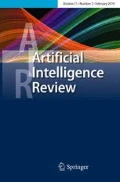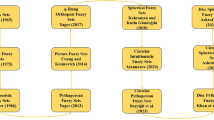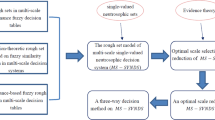Abstract
In the traditional two-way decision, there are only two kinds of decisions (i.e., acceptance and rejection). It will sometimes pay unnecessary costs when one makes decisions in this way. Therefore, a three-way decision is proposed to avoid losses that caused by error acceptance or false rejection in decision-making process. An information system is a database that represents relationships between objects and attributes. A hybrid information system is an information system where there exist many kinds of data (e.g., boolean, categorical, real-valued and set-valued data) and missing data. This paper proposes a three-way decision method in a hybrid decision information system. First, the hybrid distance between two objects based on the conditional attribute set in a given hybrid decision information system is developed. Then, the tolerance relation on the object set of this hybrid decision information system is obtained by using the hybrid distance. Next, as a natural extension of decision-theoretic rough set model in an information system, decision-theoretic rough set model in this hybrid decision information system is presented. Moreover, a three-way decision method based on this decision-theoretic rough set model is proposed by means of probability measure. Finally, an example of medical diagnosis is employed to illustrate the feasibility of the proposed method, which may provide an effective method for hybrid data analysis in real applications.

Similar content being viewed by others
References
Agbodah K (2019) The determination of three-way decisions with decision-theoretic rough sets considering the loss function evaluated by multiple experts. Granul Comput 4:285–297
Grecoa S, Matarazzoa B, Slowinskib R (2008) Parameterized rough set model using rough membership and Bayesian confirmation measures. Int J Approximate Reason 49:285–300
Guan YY, Wang H (2006) Set-valued information systems. Inf Sci 176:2507–2525
Herbert JP, Yao JT (2011) Analysis of data-driven parameters in game-theoretic rough sets. In: International conference on rough sets and knowledge technology. Springer, Berlin pp 447–456
Hu QH, Pedrycz W, Yu DR, Lang J (2010) Selecting discrete and continuous features based on neighborhood decision error minimization. IEEE Trans Syst Man Cybernet (Part B) 40:137–150
Jia F, Liu PD (2019) A novel three-way decision model under multiple-criteria environment. Inf Sci 471:29–51
Kryszkiewicz M (1999) Rules in incomplete information systems. Inf Sci 113:271–292
Li ZW, Liu XF, Zhang GQ, Xie NX, Wang S (2017) A multi-granulation decision-theoretic rough set method for distributed \(fc\)-decision information systems: an application in medical diagnosis. Appl Soft Comput 56:233–244
Li HX, Zhou XZ (2011) Risk decision making based on decision-theoretic rough set: a three-way view decision model. J Int J Comput Intell Syst 4:1–11
Liang DC, Liu D (2014) Systematic studies on three-way decisions with interval-valued decision-theoretic rough sets. Inf Sci 276:186–203
Liang DC, Liu D (2015a) Deriving three-way decisions from intuitionistic fuzzy decision-theoretic rough sets. Inf Sci 300:28–48
Liang DC, Liu D (2015b) A novel risk decision-making based on decision-theoretic rough sets under hesitant fuzzy information. IEEE Trans Fuzzy Syst 23:237–247
Liang DC, Liu D, Pedrycz W (2013) Triangular fuzzy decision-theoretic rough sets. Int J Approximate Reason 54:1087–1106
Liang DC, Pedrycz W, Liu D (2015) Three-way decisions based on decision-theoretic rough sets under linguistic assessment with the aid of group decision making. Appl Soft Comput 29:256–269
Lin GP, Liang JY, Qian YH, Li JJ (2016) A fuzzy multigranulation decision-theoretic approach to multi-source fuzzy information systems. Knowl-Based Syst 91:102–113
Liu PD (2017) Multiple attribute group decision making method based on interval-valued intuitionistic fuzzy power Heronian aggregation operators. Comput Ind Eng 108:199–212
Liu D, Li TR, Li HX (2012) Interval-valued decision-theoretic rough sets. Comput Sci 39:178–181
Liu D, Li TR, Liang DC (2014a) Three-way decisions instochastic decision-theoretic rough sets. Trans Rough Sets XVIII 18:110–130
Liu D, Li TR, Liang DC (2014b) Incorporating logistic regression to decision-theoretic rough sets for classifications. Int J Approximate Reason 55:197–210
Liu D, Liang DC (2017) Three-way decisions in ordered decision system. Knowl-Based Syst 137:182–195
Liu D, Liang DC, Wang CC (2016) A novel three-way decision model based on incomplete information system. Knowl-Based Syst 91:32–45
Mandal P, Ranadive AS (2019) Multi-granulation interval-valued fuzzy probabilistic rough sets and their corresponding three-way decisions based on interval-valued fuzzy preference relations. Granul Comput 4:89–108
Min F, He HP, Qian YH (2011) Test-cost-sensitive attribute reduction. Inf Sci 181:4928–4942
Pawlak Z (1982) Rough sets. Int J Comput Inf Sci 11:341–356
Pawlak Z (1982) Rough sets. Int J Comput Inform Sci 11(5):341–356
Pawlak Z (2012) Rough sets: theoretical aspects of reasoning about data. Springer, Belin
Slezak D, Ziarko W (2005) The investigation of the bayesian rough set model. Int J Approximate Reason 40:81–91
Swiniarski RW, Skowron A (2003) Rough set methods in feature selection and recognition. Pattern Recogn Lett 24:833–849
Wang XZ, Tsang ECC, Zhao SY, Chen DG, Yeung DS (2007) Learning fuzzy rules from fuzzy samples based on rough set technique. Inf Sci 177:4493–4514
Yang S, Yan SC, Zhang C, Tang XO (2007) Biliear analysis for kernel selection and nonlinear feature extraction. IEEE Trans Neural Netw 8:1442–1452
Yang XP, Yao JT (2012) Modelling multi-agent three-way decisions with decision-theoretic rough sets. Fundam Inf 115:157–171
Yao YY (1998) Relational interpretations of neighborhood operators and rough set approximation operators. Inf Sci 111:239–259
Yao YY (2001) Information granulation and rough set approximation. Int J Intell Syst 16:87–104
Yao YY (2009) Three-way decision: an interpretation of rules in rough set theory. Lect Notes Artif Intell 5589:642–649
Yao YY (2010) Three-way decisions with probabilistic rough sets. Inf Sci 180:341–353
Yao YY, Zhou B (2010) Naive Bayesian rough sets. Proc Rough Sets Knowl Technol 6401:719–726
Yu H, Liu ZG, Wang GY (2014) An automatic method to determine the number of clusters using decision-theoretic rough set. Int J Approximate Reason 55:101–115
Zeng AP, Li TR, Liu D, Zhang JB, Chen HM (2015) A fuzzy rough set approach for incremental feature selection on hybrid information systems. Fuzzy Sets Syst 258:39–60
Zhan JM, Sun BZ, Alcantud JCR (2019) Covering based multigranulation \((I, T)\)-Fuzzy rough set models and applications in multi-attribute group decision-making. Inf Sci 476:290–318
Zhang WX, Wu WZ, Liang JY, Li DY (2001) Rough set theory and methods. Chinese Scientific Publishers, Beijing
Zhang K, Zhan JM, Wu WZ, Alcantud JCR (2019) Fuzzy \(\beta \)-covering based \((I, T)\)-fuzzy rough set models and applications to multi-attribute decision-making. Comput Ind Eng 128:605–621
Zhang L, Zhang B (2007) Theory and application of problem solving-theory and application of granular computing in quotient spaces. Tsinghua University Publishers, Beijing
Ziarko W (1993) Variable precision rough sets model. J Comput Syst Sci 46(1):39–59
Acknowledgements
The authors would like to thank the editors and the anonymous reviewers for their valuable comments and suggestions which have helped immensely in improving the quality of the paper. This work is supported by National Natural Science Foundation of China (11971420) and Natural Science Foundation of Guangxi (2018GXNSFDA294003, 2018GXNSFDA281028, 2018GXNSFAA294134).
Author information
Authors and Affiliations
Corresponding authors
Additional information
Publisher's Note
Springer Nature remains neutral with regard to jurisdictional claims in published maps and institutional affiliations.
Rights and permissions
About this article
Cite this article
Li, Z., Xie, N., Huang, D. et al. A three-way decision method in a hybrid decision information system and its application in medical diagnosis. Artif Intell Rev 53, 4707–4736 (2020). https://doi.org/10.1007/s10462-020-09805-w
Published:
Issue Date:
DOI: https://doi.org/10.1007/s10462-020-09805-w




